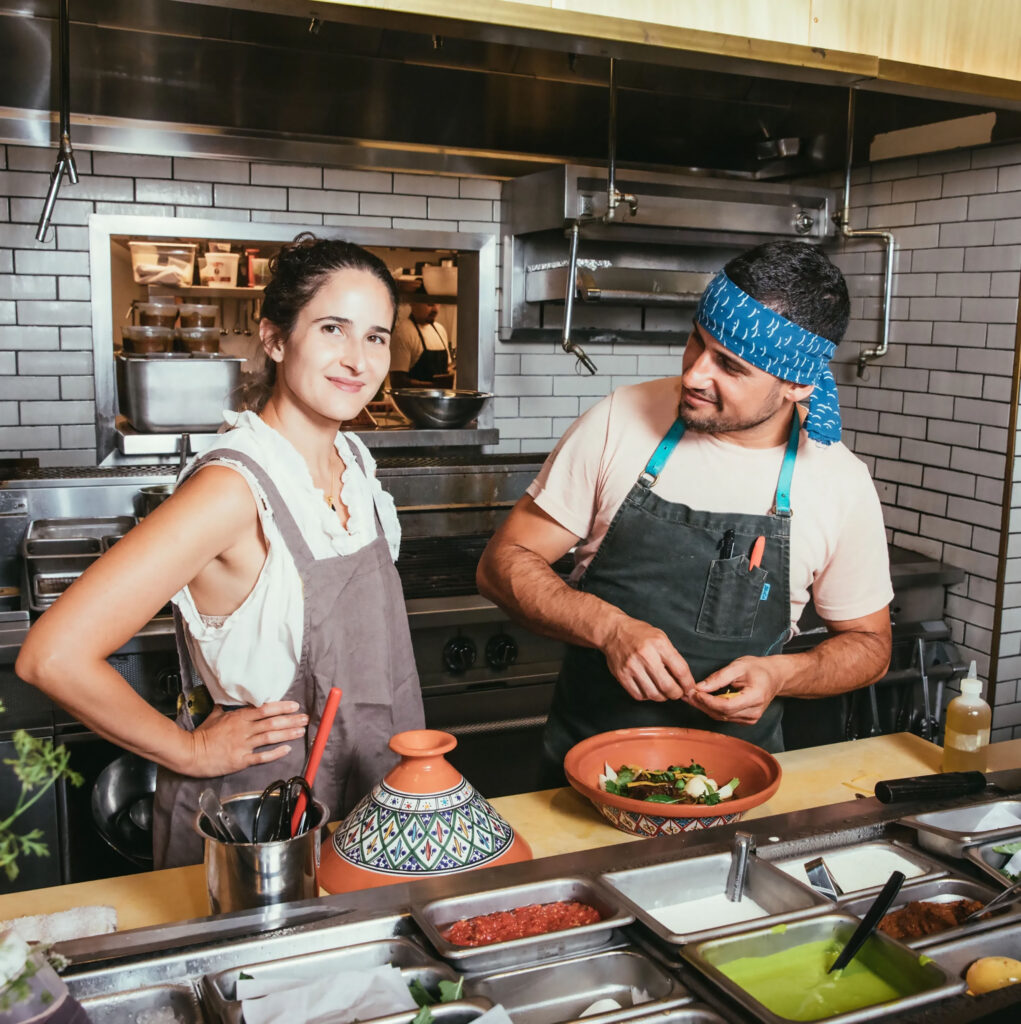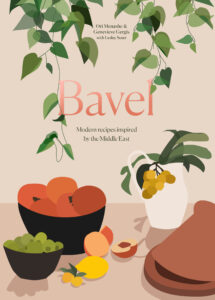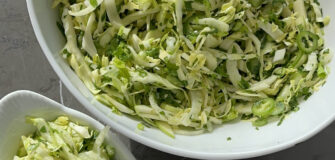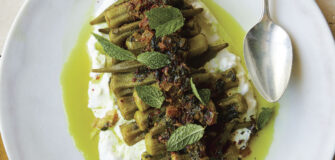Ori Menashe & Genevieve Gergis
Sharing a Life, Staying True to Their Vision
Restaurateurs Ori Menashe and Genevieve Gergis discuss their distinctive approach to cooking and curate three special recipes for the High Holidays.
By Jacqueline Fitzgerald

Pursuing a passion sometimes requires breaking a few rules. And luckily for folks who appreciate delicious food, husband-andwife chefs Ori Menashe and Genevieve Gergis, of the acclaimed restaurants Bestia, Bavel and Saffy’s, aren’t afraid to flout culinary convention.
For example, when they opened Bestia in 2012, choosing a converted warehouse on E. 7th Place in Los Angeles was a risky move. But it felt right to them, and they trusted their instincts. Menashe’s take on Italian classics and wood-fired cooking, as well as Gergis’ desserts, drew an enthusiastic response from diners. Word spread, and Bestia’s popularity grew.
No doubt Menashe’s eclectic background was conducive to creativity. Born in Southern California to Israeli parents, he and his family moved back to Israel when he was 8 years old. He grew up globetrotting and, through his parents, acquired an appreciation for fine dining.
After finishing Israeli military service, he spent a year in South America. He returned to Los Angeles and started culinary school in 2001. But he eventually dropped out, deciding he could learn more by getting a job at a restaurant. His resume includes stints at La Terza, Pizzeria Mozza, All’ Angelo and four years as chef de cuisine at Angelini Osteria.
Gergis essentially fell into the career of a restaurateur. As a youngster, she excelled at classical music (she studied French horn throughout high school in Vienna, Austria, and at USC Thornton School of Music) and began baking because she had a sweet tooth. Meeting Menashe changed her life’s trajectory.
Here, they reflect on the path they’ve traveled together, share cooking tips and holiday memories, and reveal what’s in their fridge at home.

JLiving: Both of you are self-taught or have learned on the job. Looking back, was that an advantage?
Menashe: Yes, I think there is an advantage to the fact that my thought process of cooking is not so structured, and I allow creativity to determine my steps. Over the years, I’ve also learned the classic techniques and sauces that you pick up in culinary school, so it’s a mix of both worlds.
JL: You met while working at La Terza (now closed). Can you talk about that, and did you have any idea early on what you would accomplish down the road?
Menashe: From the first day I saw Genevieve, I knew that somehow, I would need to get her to agree on going on a date with me. From that first date, we have been inseparable. I didn’t really know what I would accomplish down the road. I was just doing something I really enjoyed. Later on in my career, I then had an idea of what my goals and accomplishments should be.
JL: Are there any unexpected challenges to working together?
Menashe: Not really. We were together for seven or eight years before we started working together with Bestia.
JL: What was it like growing up in the Menashe family — all of whom loved cooking and food, especially your paternal grandmother?
Menashe: We have always had massive family gatherings that were always around the table, having amazing food and drinks. I think because of those moments, I gravitated towards hospitality. It feels really natural.
JL: Genevieve, did you ever see yourself creating desserts, managing pastry chefs, running restaurants and working on their interior design? What has surprised you the most?
Gergis: To be honest, I have never been much of a planner. I’m more fly-by-night. I remember when I was younger, people always asked what my plan was, and I always would say my plan was to go where life takes me, so my answer would be I’m not surprised at anything.
JL: What are the top cooking tips you learned from your parents and grandparents? Menashe: To take my time to develop flavor and to not rush while cooking. My grandmother used to cook for hours, and that is why her food was delicious. Sourcing the freshest and highest quality ingredients, I learned that from my father, who would go to the market and pick up meat, fish and produce.
Gergis: No one in my family really made desserts, especially since my mom is a granola-type health nut. My birthday cakes were served with a light sprinkling of powdered sugar rather than the frosting I dreamed of. My cooking inclination comes from the science side of my family, which would be my father, who was an engineer for Rockwell Boeing. Pastry is deeply related to science, so being brought up in a scientific household made the science of baking seem natural. JL: You opened Bestia in 2012, Bavel in 2018, and then Saffy’s in 2022, named for your daughter Saffron, who was then 8 years old. Also, you’ve written cookbooks. What were some of the highlights and challenges of those endeavors?
Menashe: Highlights were cooking at all three restaurants on their opening nights. My family would always travel to Los Angeles during each of the openings, and being able to cook for them was amazing. Equally amazing was cooking for the late [celebrated food critic] Jonathan Gold, my mentor Gino Angelini, and all the chefs whom I have always looked up to and been inspired by.
The challenges would definitely be the pandemic along with the massive kitchen fire we had at Bestia. Then there are all the mini challenges, such as blackouts or gas companies shutting off our lines. Those challenges are just part of the job.
JL: With Bavel and later Saffy’s, did you feel Angelenos were ready to embrace Middle Eastern food, and how did you come up with your own unique offerings?
Menashe: L.A. is a melting pot of cultures. This food is familiar to the people here. The menus are a combination of Middle Eastern, North African and Mediterranean, so I can’t really pinpoint where my inspiration comes from. A lot of it is just my evolution of being a chef. Layering spices is definitely important for the end product to not feel muddled, but vibrant and clean.
JL: How does the bounty of So Cal’s produce and other food items tie into your cooking? Menashe: California has the same climate as the Mediterranean, so I have access to the same ingredients, or at least very similar ones.
JL: Do you have any favorite childhood memories of High Holiday family gatherings and meals for Rosh Hashanah and/or breaking the Yom Kippur fast?
Menashe: Yes, I fondly remember all of those meals, enjoying great food and company on Rosh Hashanah, which would never typically be traditional at my house. On Yom Kippur, we would always eat something light. My mom would make honey cake, and we’d drink tea or eat vegetables and soup.
JL: How often do you get to see your extended family these days, and what are holidays like when you gather?
Menashe: We gather every holiday because most of my family is here. We keep the food nontraditional, but we follow all the steps and prayers.
JL: How did your Jewish faith shape you, and is it still important to you today?
Menashe: Neither my wife nor I are religious, so for me my Jewishness has always been about family connections to ancestry and the keeping of beautiful traditions.
JL: What is most fulfilling or meaningful about cooking in your restaurants?
Menashe: Seeing employees of mine evolve and open their own restaurants and build a name for themselves. Teaching the young generation of cooks and seeing how they evolve and get better in their skills. Also seeing customers enjoy and appreciate what we do.
JL: Do you cook with your daughter, Saffron?
Both: Yes, we cook all the time, and we do home videos recording us making different recipes.
JL: What items are always in your fridge at home?
Both: A bunch of pickles, soy sauce, miso, capers, mustard, anchovies, cheeses and a lot of produce.
Recipes reprinted with permission from “Bavel: Modern Recipes Inspired by the Middle East” by Ori Menashe, Genevieve Gergis and Lesley Suter, copyright © 2021. Published by Ten Speed Press, an imprint of Penguin Random House.” Photographs copyright © 2021 by Nicole Franzen































